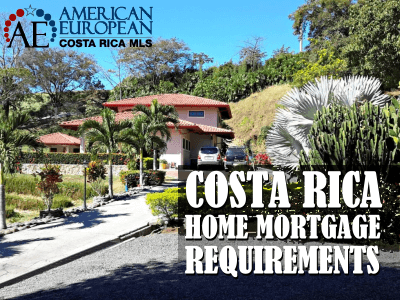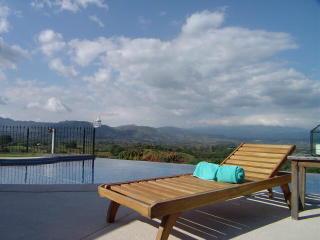 Looking to get financing for a Costa Rica real estate purchase? Then you need to fulfill several requirements for a mortgage. The most important one is that you need to be a resident of Costa Rica or you have to buy cash. Very few banks will give a mortgage to a non-resident.
Looking to get financing for a Costa Rica real estate purchase? Then you need to fulfill several requirements for a mortgage. The most important one is that you need to be a resident of Costa Rica or you have to buy cash. Very few banks will give a mortgage to a non-resident.
The mortgage rates are much higher than what you might be used to. For a residential mortgage, the rates run somewhere between 8 and 10% annually. And they do NOT depend on your credit score!
Our Mortgages or Financing in Costa Rica article explains all about the options you have for getting a mortgage when you are purchasing a property in Costa Rica. There, you can also read up on the different mortgage conditions that Costa Rican banks can offer.
If you are a legal resident, the Costa Rica banking system offers quite a few financing options. You will either need to check with every bank what their requirements for a mortgage are or you need to have a good real estate agent, preferably one affiliated with the American European real estate group.
Mortgage brokers
Mortgage brokers in Costa Rica do not exist because local banks will not pay any commissions for getting mortgage business. You might find a couple of private companies who will walk you through the process to fulfill the requirements for a mortgage. But you will have to pay them separately for this service.
Credit score
Many countries do not have a formal credit report system, like for example Venezuela. For this reason, Venezuelans will have a difficult time getting any mortgage in Costa Rica, unless they can show a local record. Most banks will accept US and Canadian credit score systems.
Mortgage Payment Percentage of your income
Most banks will not allow your mortgage payment to be more than 30% of your net income (debt-free income).
Requirements to apply for a mortgage

Some banks in Costa Rica have English spoken officers who can help you. Though most banks don’t offer the requirements for a mortgage in English. They will all request the same documents as these are now regulated by SUGEF, the Costa Rican bank regulator.
- Application form signed by the customer.
- Income verification.
- A copy of ID for residents and two identifications (drivers’ license, passport).
- Social security number.
- Exact address from your house on a utility bill or property tax bill.
- A copy of bank statements from investments, retirement accounts, current and savings accounts (for the last six months).
- A copy of the last three months of the credit card statements.
- Evidence of assets (deed of warranties, certificates of title) in the name of the customer or customer’s corporation.
- Register study of the properties in Costa Rica and cars owned by the customer. (If the customer have these kinds of assets in Costa Rica)
- Tax certification of all municipal taxes paid over the property to be bought.
- Copy of the purchase-sale agreement. You will need to get your own attorney to write this up for you with the help of your real estate agent. The cost varies between US$250 and 1% of the sales price. Ask your real estate agent to recommend an attorney for this.
- Two copies of the certified surveys of the property (by Catastro Nacional).
- A utility bill with your current address in the U.S. or Costa Rica.
- Home insurance as well as Life insurance.
Income verification
Most banks will use the following for income verification:
a) Salaried borrower working for a company registered in Costa Rica, must present an income verification letter issued by the company and addressed to the bank. The official letter must indicate the time the person has worked for the company, job position, and gross and net salary. To be included with “orden patronal” (proof of insurance e by the CCSS)
b) A self-employed borrower, certified income by authorized CPA, addressed to the bank, must indicate activity of the company, current job position, average gross and net income during the last fiscal period, and up–to–date average. Must include all resources used to certify income such as account statements, receipts, etc.
c) A borrower with foreign income, certified income by authorized CPA (Certified Public Accountant), addressed to the bank, must indicate activity of the company, current job position, average gross and net income during last fiscal period, and up-to-date average. Must include all resources used to certify income such as account statements, receipts, etc. Copy of the last three years of the Income Tax Return Report from the US. (including the W2 form) If the certification from the public accountant is done outside of Costa Rica it must be notarized by Costa Rican Consulate in the respective country.
More
Make sure you check the above with the bank where you will apply for your house mortgage as it can be different from the above.
You can also get more information on mortgages and financing in Costa Rica in general and about the Costa Rica mortgage conditions in another article.
Looking for a VA loan, then read this article.
More about Loan to Value in this article.
Are you looking for a residential loan and can’t get a mortgage with a local bank? Then fill out the form below and a private lender will get back to you soon
[gravityform id=”5″ title=”false” description=”false” ajax=”true”]
Feel free to leave your comments on this blog. If you like this article, please feel free to share it on your social media.
If you like this blog, subscribe to our newsletter by clicking the banner below.
While we’re at it, I DO want to remind our readers that we appreciate any referrals you can send us. Finally, please remember the American-European real estate Group’s agents when you refer a real estate agent. Because we DO appreciate your business.




















